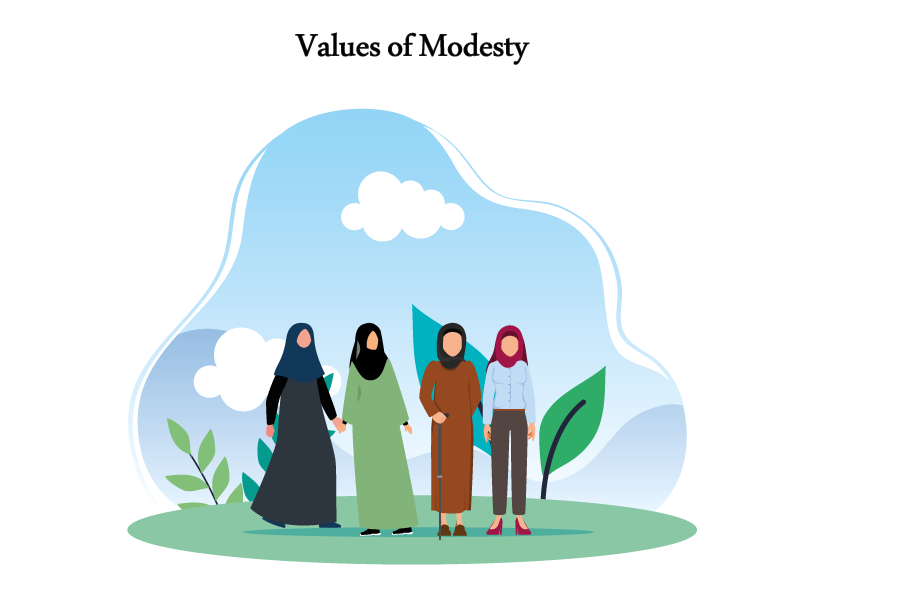Modesty in Islam
Modesty in Islam, often referred to as “Haya,” is a comprehensive concept that encompasses various aspects of a believer’s life, character, and behavior. It is a virtue that reflects humility, decency, and a sense of propriety in all aspects of one’s interactions and presentation.
Modesty in Islam is a multifaceted value that guides believers in their appearance, behavior, and relationships. It shapes their character and actions, promoting a sense of humility, decency, and respect for oneself and others.
Importance of Modesty in Islam
Modesty in Islam holds significant importance, as it is considered a virtue that fosters a sense of humility, self-respect, and modest behavior in the life of a devout Muslim. The concept of modesty in Islam, known as “Haya” in Arabic, encompasses various aspects of a person’s life, including dress, speech, actions, and interactions with others. Islamic teachings emphasize the value of modesty as a means to enhance spirituality, promote moral character, and build strong communal bonds within the Muslim community.
In Islamic ethics, modesty extends to interactions between men and women. Islam promotes a healthy and respectful relationship between the sexes, encouraging modest behavior and avoiding situations that may lead to immodest behavior or inappropriate interactions.
Modesty in Islam is also intertwined with the concept of “Ihsan” or excellence in worship. Muslims are encouraged to worship Allah with sincerity and humility, recognizing that He is all-seeing and all-knowing. Modesty in Islam involves focusing on the act of devotion and not seeking attention or praise from others for one’s religious practices.
Modesty in Islam holds a pivotal place, influencing various aspects of a Muslim’s life. It is not just limited to the way one dresses, but also encompasses behavior, speech, and attitudes towards others. Emphasizing the value of humility and self-restraint, modesty in Islam is a means to enhance one’s spirituality, uphold moral principles, and strengthen communal ties within the Muslim community. By embodying modesty in their daily lives, Muslims aim to cultivate a more just, compassionate, and respectful society, aligning their actions with the teachings of Islam and seeking the pleasure of Allah.
Values of Modesty in Islam
Modesty in Islam is a virtue that reflects humility, decency, and self-restraint in one’s behavior, appearance, and interactions with others. It is a value that is highly regarded in various cultures and societies worldwide. Here are some of the key values associated with modesty in Islam:
-
Humility:
Modesty in Islam is rooted in humility, where individuals acknowledge their strengths and achievements but do not boast or flaunt them. They remain down-to-earth and recognize that everyone has their unique abilities and contributions. It is stated in the Surah Furqan,
وَعِبَادُ ٱلرَّحْمَٰنِ ٱلَّذِينَ يَمْشُونَ عَلَى ٱلْأَرْضِ هَوْنًا وَإِذَا خَاطَبَهُمُ ٱلْجَٰهِلُونَ قَالُوا۟ سَلَٰمًا
The servants of the Most Merciful are those who walk upon the earth in humility, and when the ignorant address them, they say words of peace.
(AlQuran 25:63)
And in the Surah Al-Araf, it is stated that Allah does not love those who broke the limits of Allah Almighty and become arrogant.
ٱدْعُوا۟ رَبَّكُمْ تَضَرُّعًا وَخُفْيَةً ۚ إِنَّهُۥ لَا يُحِبُّ ٱلْمُعْتَدِينَ
Call upon your Lord in humility and privately; indeed, He does not like transgressors.
(AlQuran 7:55)
-
Respect for Others:
Being modest involves showing respect for others by not seeking to dominate conversations or situations, and by being considerate of their feelings and opinions.
As it is stated in the Hadith
“That person is not one of us who is not merciful to our youngsters and respectful to our elders.”
Modest individuals listen attentively and avoid interrupting or dismissing others’ viewpoints.
-
Avoiding Arrogance:
Modest individuals avoid excessive preoccupation with their appearance or possessions. They do not seek attention or validation solely based on their looks, material possessions, or accomplishments. The Quran and Hadiths (sayings and actions of the Prophet Muhammad, peace be upon him) guide this matter.
لِّكَيْلَا تَأْسَوْا۟ عَلَىٰ مَا فَاتَكُمْ وَلَا تَفْرَحُوا۟ بِمَآ ءَاتَىٰكُمْ ۗ وَٱللَّهُ لَا يُحِبُّ كُلَّ مُخْتَالٍ فَخُورٍ
So that you not despair over what has eluded you and not exult [in pride] over what He has given you. And Allāh does not like everyone self-deluded and boastful –
(AlQuran 57:23)
The Prophet Muhammad (peace be upon him) said,
“Allah has revealed to me that you should humble yourselves to one another. One should neither hold himself above another nor transgress against another.”
(Sahih Bukhari 6035)
-
Gratitude towards Allah and others:
Expressing gratitude towards Allah and being thankful for His blessings is considered an essential part of a believer’s relationship with their Creator. Modest individuals express gratitude for the opportunities and support they receive in life. The Quran mentions the importance of gratitude in Surah Ibrahim
وَإِذْ تَأَذَّنَ رَبُّكُمْ لَئِن شَكَرْتُمْ لَأَزِيدَنَّكُمْ ۖ وَلَئِن كَفَرْتُمْ إِنَّ عَذَابِى لَشَدِيدٌ
And [remember] when your Lord proclaimed, ‘If you are grateful, I will surely increase you [in favor]; but if you deny, indeed, My punishment is severe.’
(AlQuran 14:7)
They acknowledge the help of others in their success and don’t take it for granted. The Prophet Muhammad (peace be upon him) emphasized gratitude in his sayings and teachings. He highlighted the significance of being grateful for both blessings and trials:
“Whoever does not thank the people, he does not thank Allah.” (Sunan Abi Dawood)
And it is also stated,
“Look at those below you (less fortunate than you), and do not look at those above you (more fortunate than you), as this is more suitable lest you should underestimate Allah’s favors on you.” (Sahih Al-Bukhari)
-
Tolerance and Acceptance:
Tolerance and acceptance are essential aspects of modesty in Islam that promote peace and coexistence within the diverse Muslim community and with people of different beliefs and backgrounds. Modesty in Islam, as demonstrated through tolerance, encourages Muslims to show patience and understanding toward others’ viewpoints and practices. It involves refraining from imposing one’s beliefs on others forcefully and instead engaging in respectful dialogue to foster mutual understanding.
Prophet Muhammad (peace be upon him) demonstrated remarkable tolerance and acceptance towards people of various backgrounds, including those who held opposing beliefs. He treated all individuals with kindness and fairness, even in times of disagreement. This exemplifies the Islamic principle of embracing diversity while maintaining humility and open-mindedness. Muslims are encouraged to follow the Prophet’s example and cultivate an environment of tolerance and acceptance within their communities and society at large, fostering peaceful coexistence and understanding among people of different faiths and cultures.
-
Personal Growth:
No one is flawless but there is always room for development and refinement. That’s why personal growth is an essential aspect of modest individuals who acknowledge their imperfections and embrace the notion of continuous improvement. With a humble outlook, they actively seek opportunities to learn from others, valuing diverse perspectives and experiences.
By recognizing their limitations and being receptive to self-improvement, modest individuals embark on a journey of constant learning and self-discovery. They take ownership of their actions and seek ways to enhance themselves emotionally, intellectually, and spiritually. This mindset of humility enables them to engage in lifelong learning, appreciating the wisdom shared by others and leveraging it to become better versions of themselves. The pursuit of personal growth in a modest manner not only enhances their own lives but also serves as an inspiration for others, encouraging a culture of continuous learning and development within their community or workplace.
-
Decency and Dignity in Dressing:
One of the primary manifestations of modesty in Islam is in the way Muslims dress. Both men and women are encouraged to dress modestly, covering their bodies in a way that reflects dignity and respect. For women, this often involves wearing the hijab or other modest attire, which symbolizes their devotion to Allah and helps them guard their beauty from unwanted attention. For men, modesty in dress means avoiding clothing that is revealing or ostentatious, ensuring that their attire is modest and unassuming.
In the Surah Al Araf, it is stated,
يَٰبَنِىٓ ءَادَمَ قَدْ أَنزَلْنَا عَلَيْكُمْ لِبَاسًا يُوَٰرِى سَوْءَٰتِكُمْ وَرِيشًا ۖ وَلِبَاسُ ٱلتَّقْوَىٰ ذَٰلِكَ خَيْرٌ ۚ ذَٰلِكَ مِنْ ءَايَٰتِ ٱللَّهِ لَعَلَّهُمْ يَذَّكَّرُونَ
O children of Adam, We have bestowed upon you clothing to conceal your private parts and as adornment. But the clothing of righteousness – that is best. That is from the signs of Allāh that perhaps they will remember.
(AlQuran 7:26)
Prophet Muhammad (peace be upon him) said
“The best of your garments are the simple ones. And beware of trailing garments, for they are a source of pride and also a cause of arrogance.” (Sunan Ibn Majah)
-
Empathy:
By practicing empathy, modest individuals foster strong interpersonal connections and build trust with others. They create a safe and supportive space for people to share their thoughts and feelings without fear of judgment. This empathetic approach enables modest individuals to respond to others with kindness, sensitivity, and respect, enhancing their ability to build meaningful relationships and contribute positively to their communities. Ultimately, empathy in modesty goes beyond self-interest, encouraging individuals to be mindful of the impact their actions and words have on the feelings and experiences of others.
Modesty and Modern Challenges
Modesty, a cherished virtue in Islam, faces unique challenges in the modern world. The rapid pace of technological advancement, changing societal norms, and the increasing influence of globalized media have introduced new complexities that impact how modesty is understood and practiced within Muslim communities.
The rise of Western fashion and the prevalence of revealing clothing in popular culture can create a clash between Islamic principles of modesty and societal pressures to conform to these trends. Muslim individuals, especially the younger generation, are in a dilemma of navigating between their faith-based values and the desire to fit in or express their personal style.
The digital age has also posed challenges to modesty, as social media platforms expose users to a wide array of content that may not align with Islamic principles. The addition of images and videos that objectify individuals and promote immodest behavior can make it challenging for Muslims to maintain a modest online presence. Striking a balance between participating in the digital world and upholding modesty becomes a considerable concern, especially as online interactions increasingly shape real-world perceptions.
Furthermore, the increased interaction between diverse cultures and lifestyles due to globalization has led to a wider range of interpretations regarding modesty in Islam. Muslim communities in various parts of the world may differ in their practices and understandings of modesty, influenced by their local cultures and customs. This can lead to debates within the Muslim community about what constitutes modest behavior, attire, and interactions, further complicating the application of this principle in a universally consistent manner.
In the face of these challenges, it is important for Muslims to engage in thoughtful reflection and dialogue. Islamic scholars, community leaders, and individuals need to discuss how to address these modern challenges while remaining true to the essence of modesty as prescribed by Islamic teachings. This involves promoting education and awareness about the significance of modesty in Islam and encouraging critical thinking to navigate the complexities of the modern world while upholding core values.
Conclusion
In a world where the lines between cultures and lifestyles blur, and where social media amplifies immodest influences, the teachings of Islam provide a steady compass. Embrace your individuality while adhering to the principles of modesty. Seek knowledge, engage in meaningful conversations, and consult knowledgeable scholars to understand the evolving challenges and how they intersect with Islamic values.
Empower the next generation with a profound understanding of modesty in Islam, teaching them the beauty of humility, respect for others, and the importance of dressing and behaving with dignity. Instill in them the ability to navigate the complexities of the modern world while staying true to their faith.
Remember, modesty in Islam is a reflection of our devotion to Allah and a commitment to living a life of balance and purpose. Let it serve as a guiding light that shines through cultural shifts and societal pressures. Uphold modesty not out of fear, but out of love and reverence for Allah and His teachings.

















